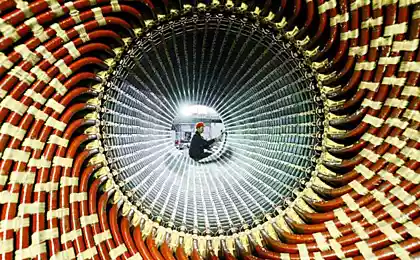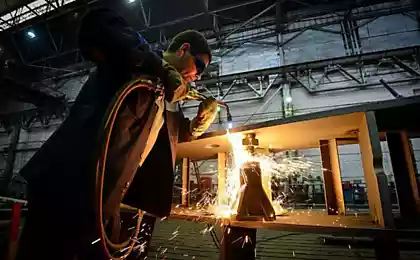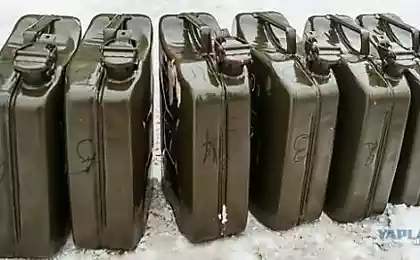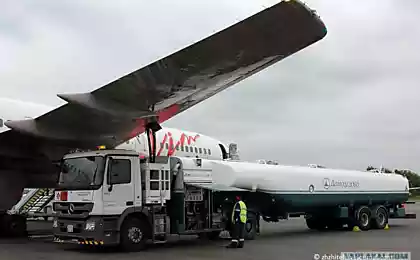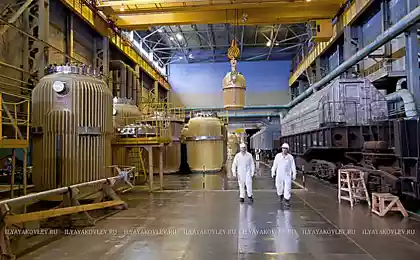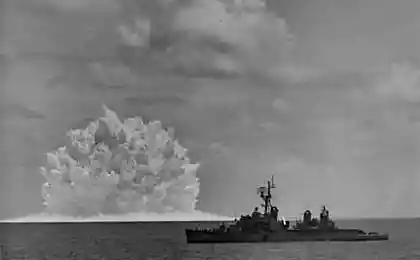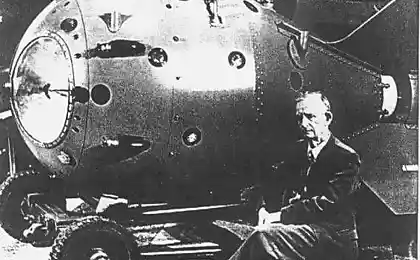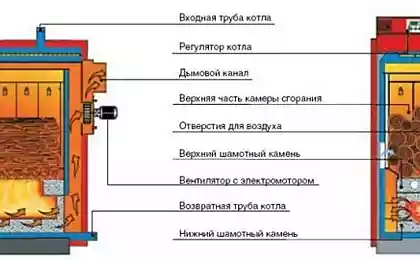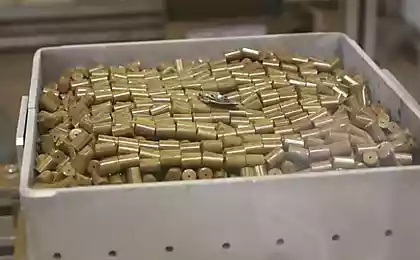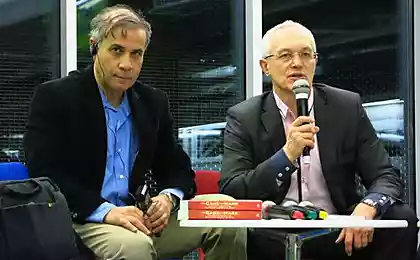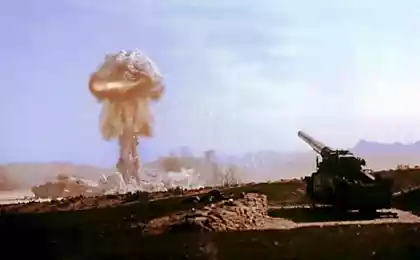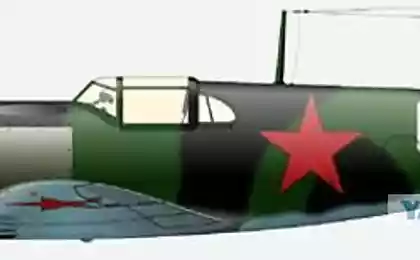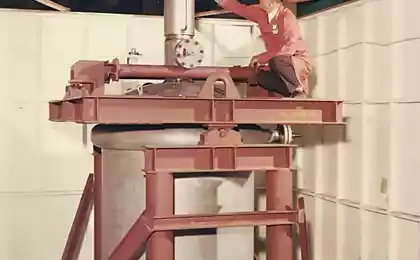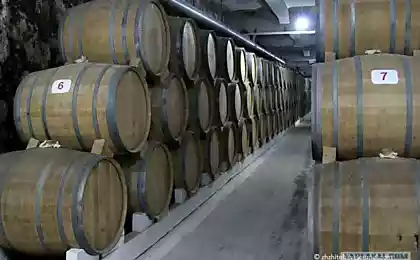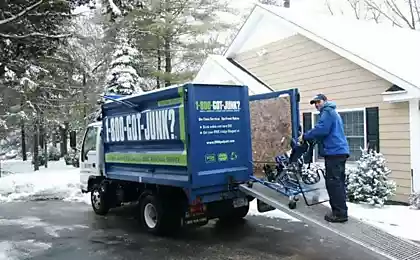1595
RT-1 plant for reprocessing spent nuclear fuel
LJ user uralochka writes in his blog: A stay at "Mayak" I always wanted.
No joke, this place is one of the most high-tech enterprises in Russia, here
had in 1948 launched the first nuclear reactor in the USSR, a specialist in "Mayak" was released
charge plutonium for the first Soviet nuclear bomb. When the called Ozersk
Chelyabinsk-65, Chelyabinsk-40, in 1995 he became Ozersk. We Triokhgorny,
once Zlatoust-36, the city which is also closed, Ozersk always called
"Sorokovke" treated with respect and awe.
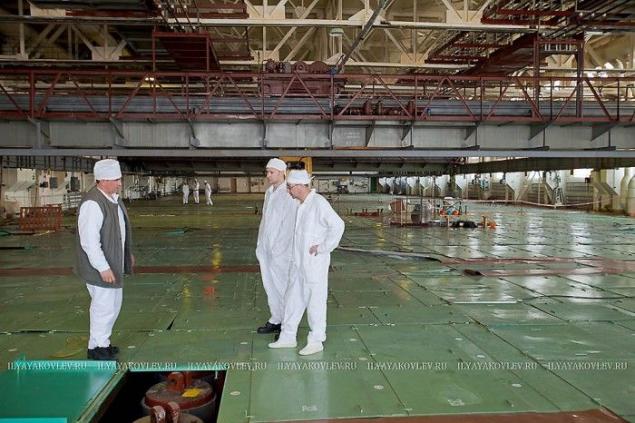
It is now possible to read much into the official sources, and even more in the informal,
but there was a time when even the approximate location and the name of the city were kept in the strictest
secret. I remember me and my grandfather Eugene M. Yakovlev, went fishing, duck on
local issues - where we are, my grandfather always told that Yuryuzan from (the neighboring town with Trehgornyi),
and at the entrance to the city there were no signs other than constant "brick". My grandfather was one of
best friends, called him Mitroshin Yuri Ivanovich, why I did it all my childhood called not otherwise
as "Vanaliz" I do not know why. I remember I asked my grandmother why,
Vanaliz, a bald, because not a single hairs? Grandmother then told me in a whisper,
Yuri Ivanovich served in "sorokovke" and eliminate the consequences of major accidents in 1957,
received a large dose of radiation, the procedure spoiled his health, and his hair grow longer ...
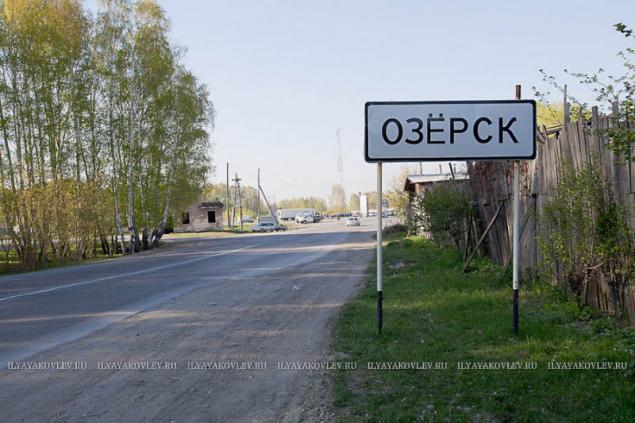
... And now, many years later, I, as a photojournalist to shoot the same food plant RT-1
Agency "Photo ITAR-TASS". Time changes everything.
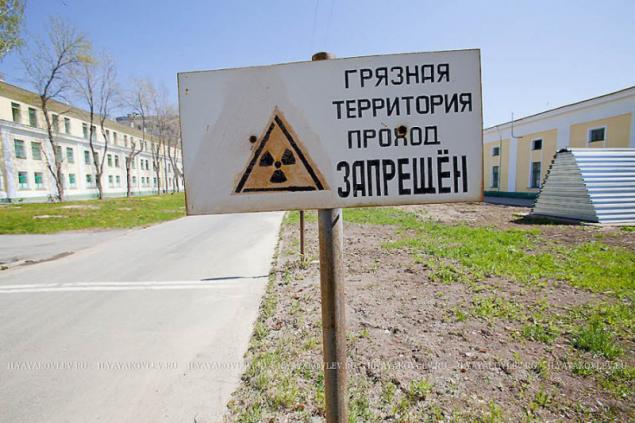
Ozersk - modal city, enter a pass, my profile was more than a month to check and
Now everything is ready, you can go. I met the press officer at the checkpoint, unlike
here is our normal computerized system call in any PPC traveling so
as any. After that we drove to the administrative building of the press service, there I left
my car, and I was advised to leave the cell because inside the plant with
Mobile communications is prohibited. Said done, we go to the RT-1. The plant
long toiled at the checkpoint, as it is not just we have missed with all of my photographic equipment, but it
It happened. We were given a stern man with a black holster on his belt and a white dress. We met
with the administration, we have formed a team of escorts and we moved to the rank. propusknik.
Unfortunately, the exterior of the plant, and what a security complexes photographed
is strictly forbidden, on this all this time my camera was lying in a backpack. Here's the footage I
withdrew at the very end, there begins conventionally "dirty" area. Separation is
indeed arbitrary, but follow very strictly, that is what makes it possible not to take away
radioactive dirt all over the neighborhood.
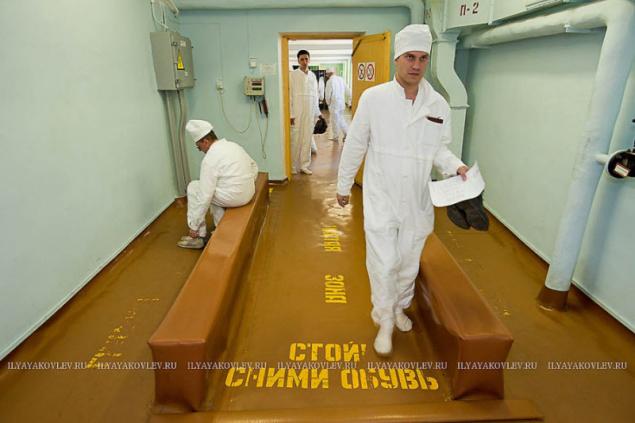
San. propusknik separate women from one entrance to another man. I have my companions
shown on the cupboards, and said shoot all (absolutely all), wear rubber flip flops, closes
locker and move out to the window. So I did. I stand completely naked in one hand
I key in another bag with a camera, and the woman out of the window, which is why it is
too low for such a situation interested in my what my shoe size. Long
did not have to be embarrassed, I was promptly given something like drawers, light shirt,
overalls and shoes. All white, clean and very pleasant to the touch. Dressed, trailers for
breast pocket dosimeter tablet and felt confident. You can be nominated.
Guys I immediately instructed that the backpack on the floor not to, do not touch too much,
photographed only that allow. No problem - I tell me the backpack is too early
throw, and the secrets of the problem I also do not need. Here is the place where to attach and remove
dirty shoes. At the heart of clean, dirty on the edges. Conditional threshold of the territory of the plant.
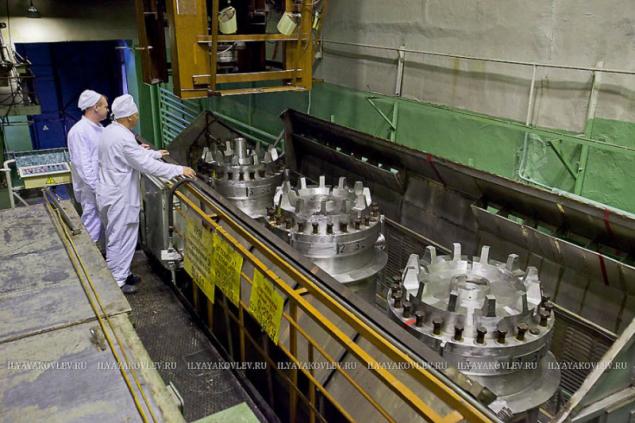
On the territory of the plant, we moved to a small bus. Foreign territory without special
embellishment, blocks of shops galleries related to the passage of personnel and transfer of chemicals through the pipes.
On the one hand there is a large gallery finishing intake air from the nearby forest. It
done to the people in the shops outside breathing fresh air. RT-1 is only
one of seven factories "Mayak", the appointment of its reception and processing of spent nuclear
fuel (SNF). This shop where it all begins, here come the containers with spent nuclear fuel.
On the right car with the lid open. Experts unscrew top screws special
equipment. After that, all of this space is removed, a large door closes
thickness of about half a meter (unfortunately rezhimschiki asked her to remove the pictures).
Further work is cranes, which are controlled remotely via the camera. Cranes removed
Cover and remove from the spent fuel assemblies.
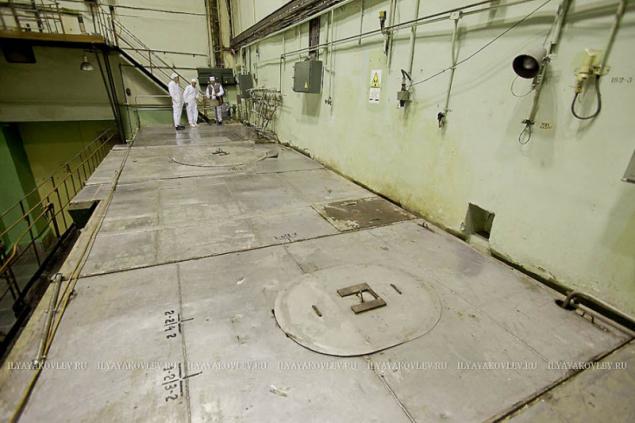
Crane assemblies are transferred here in these hatches. Pay attention to the crosses, they are drawn,
It makes it easier to position the position of the valve. Under the hatches assembly immersed in
liquid - condensate (simply put in distilled water). After this assembly
carts are moved to a nearby swimming pool, which is a temporary warehouse.
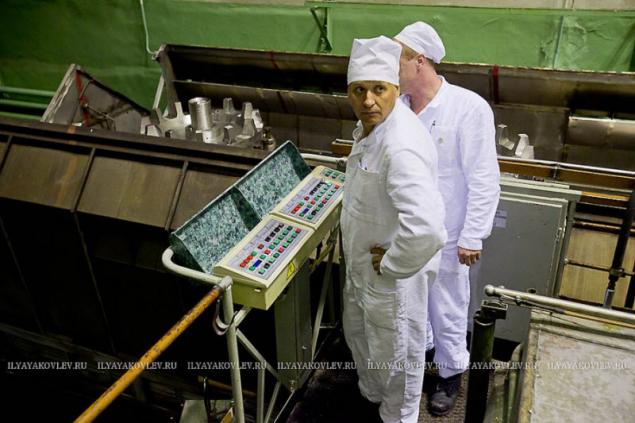
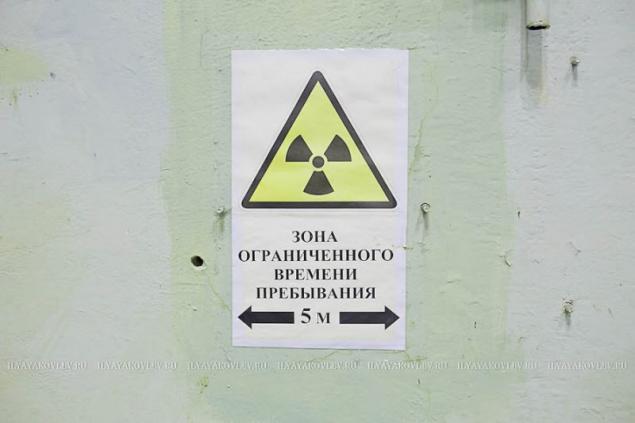
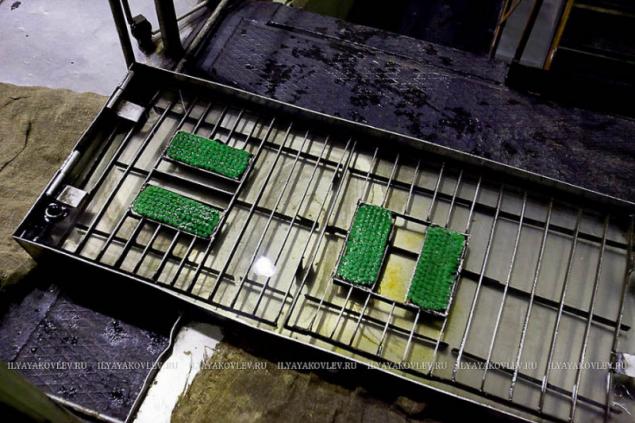
I do not know exactly what it's called, but the point is clear - a simple device to avoid
drag radioactive dust from one room to another.
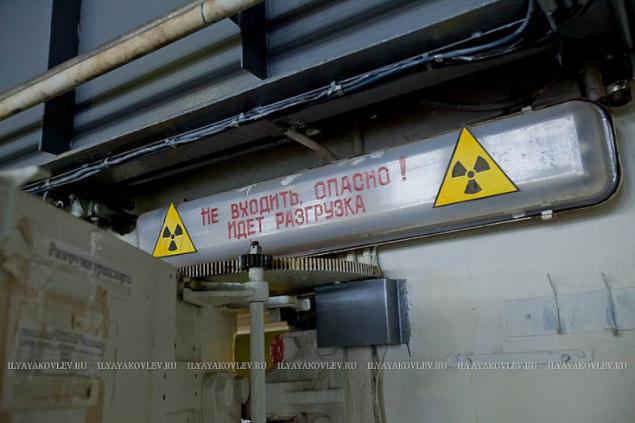
On the left, the same door.
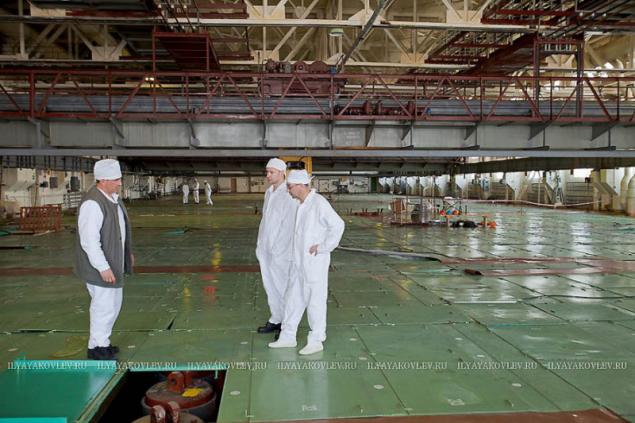
And this is the adjacent room. Underfoot employees is a swimming pool, with a depth of 3, 5 and 14
meters filled with condensate.? Yet there can be seen two blocks from the Beloyarsk NPP, their length of 14 meters.
AMB called - "a great peaceful atom».
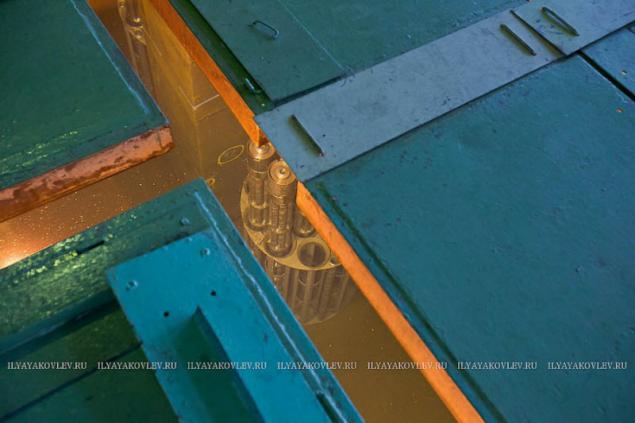
When you look between the metal plates, you see something like the following picture. Under condensate
you can see the assembly of the fuel cell from the shipping of the reactor.
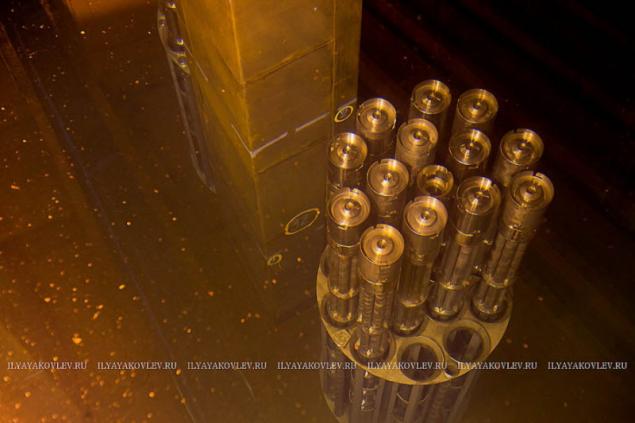
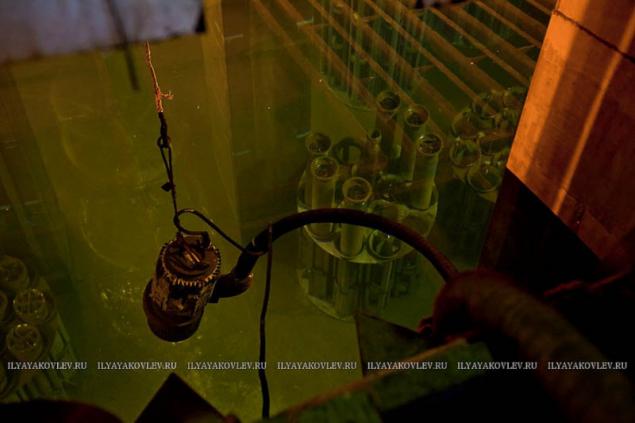
Insipid frame, just like the way the elements are arranged.
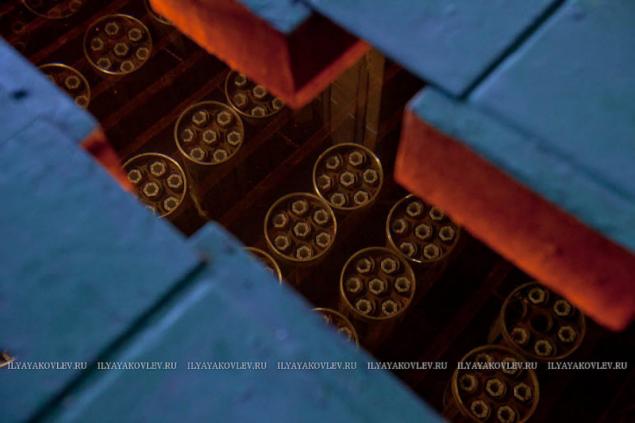
But these assemblies come only from nuclear power plants. When turned off the light, they glowed a pale blue glow.
Very impressive. This is the Cerenkov radiation, the essence of this physical phenomenon can be found in Wikipedia.
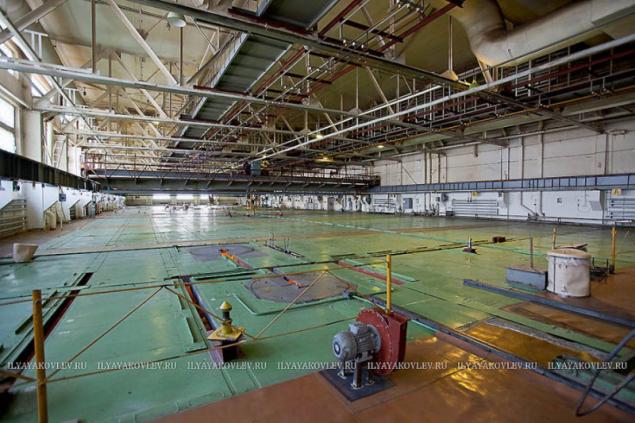
General view of the shop.
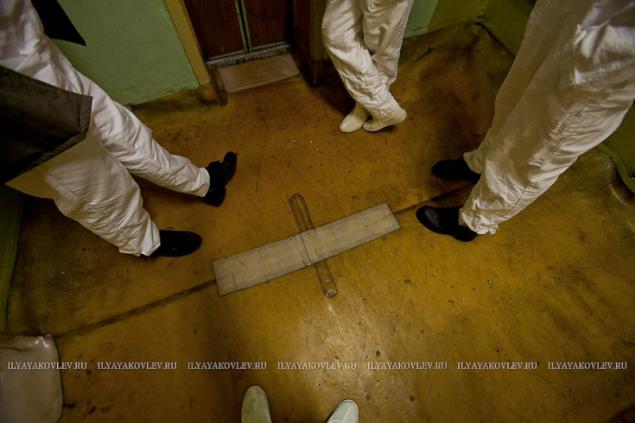
Go ahead. Transitions between departments through the corridors with dim yellow light. Underfoot enough
specific coating, roll all the angles. People in white. In general, I like that once, "Black Mass»
remembered))). By the way, about the coverage, a very reasonable decision, on the one hand it's more convenient to wash,
It does not get stuck anywhere, and most importantly, in the event of any leak or accident can be a dirty floor
easy to dismantle.
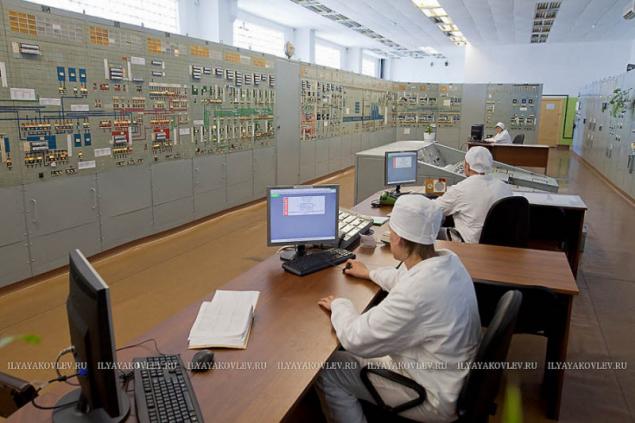
As I explained further operations with SNF are indoors in an automatic mode.
The whole process, when it ruled here with these consoles, but now everything happens on three terminals.
Each of them works in its stand-alone server, all the functions are duplicated. In case of refusal of
terminal operator will be able to complete the process from the console.
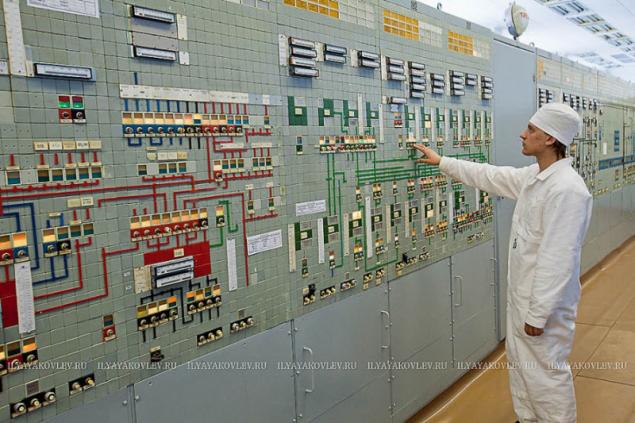
Briefly about what happens to the spent nuclear fuel. Build understand, stuffing removed, sawn into
pieces and placed into a solvent (nitric acid), then dissolved spent fuel
passes a complex chemical transformations, there is extracted from the uranium, plutonium, neptunium.
Not soluble portion that can not be processed and compressed osteklenyayutsya. And kept on
inside the plant under constant observation. At the exit after all these processes is formed
ready to build already "charged" with fresh fuel, which is produced here. Thus Lighthouse
provides a full cycle of the nuclear fuel.
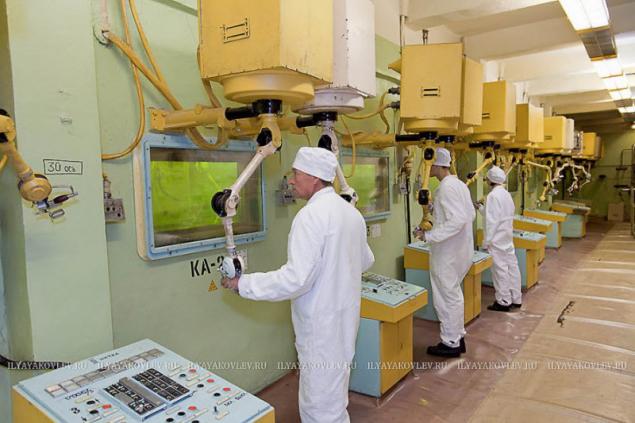
Department on work with plutonium.
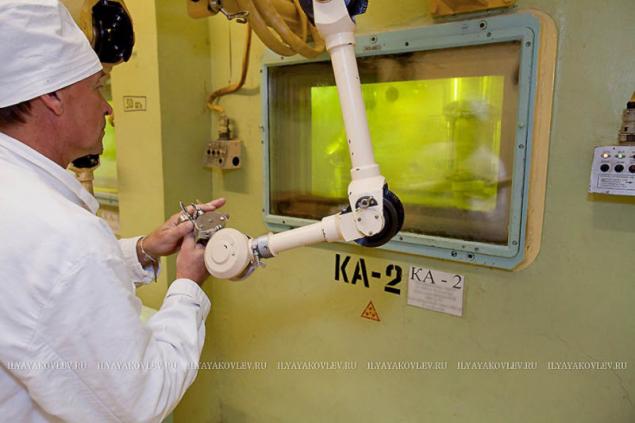
From the active elements of the operator protects eight layers of 50 mm leaded glass. Pointing
linked exclusively electrical connections, no "holes" connecting with the inner compartment no.
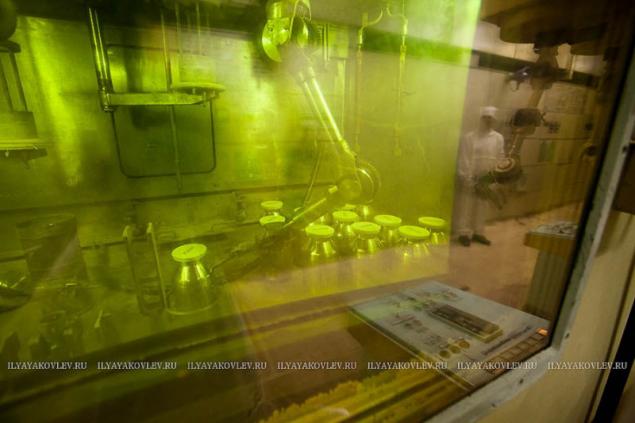
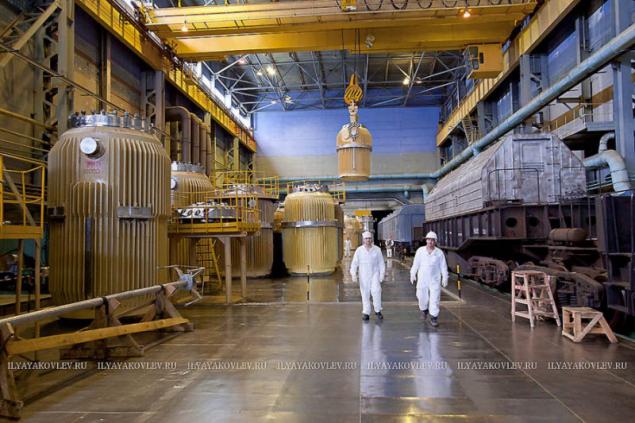
We moved into the shop, which deals with the shipment of finished products.
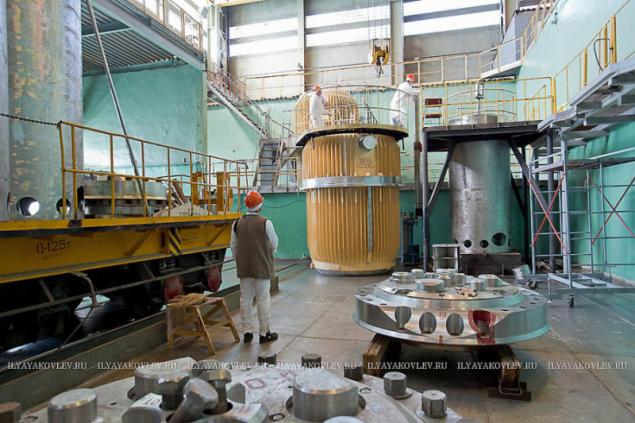
Yellow container for transportation of finished fuel assemblies. In the foreground of the container lid.
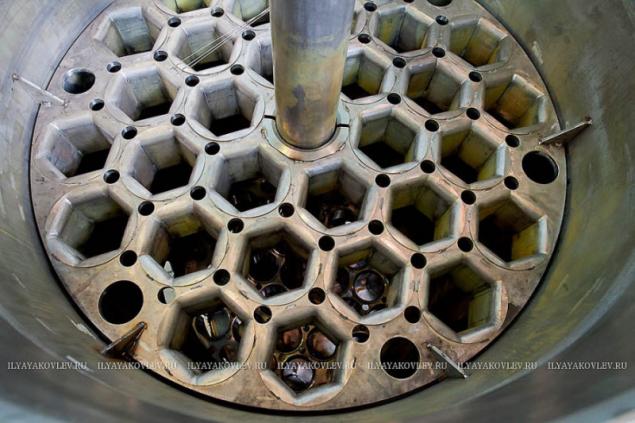
The inner container, here apparently mounted fuel rods.
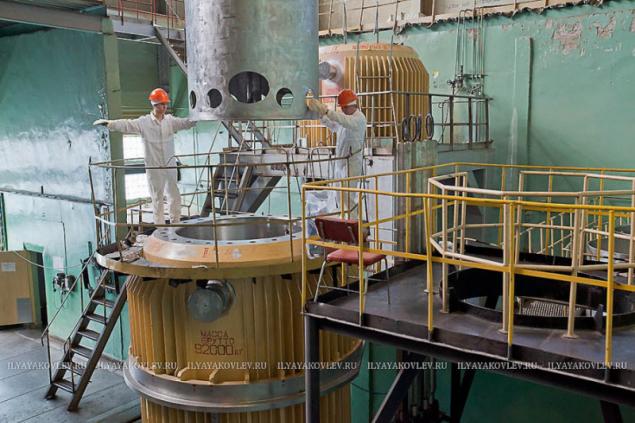
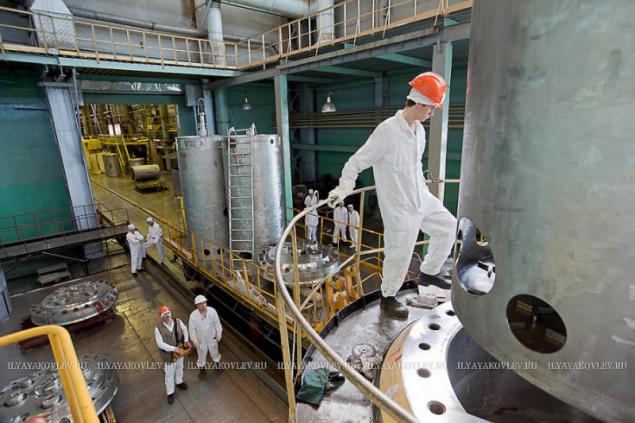
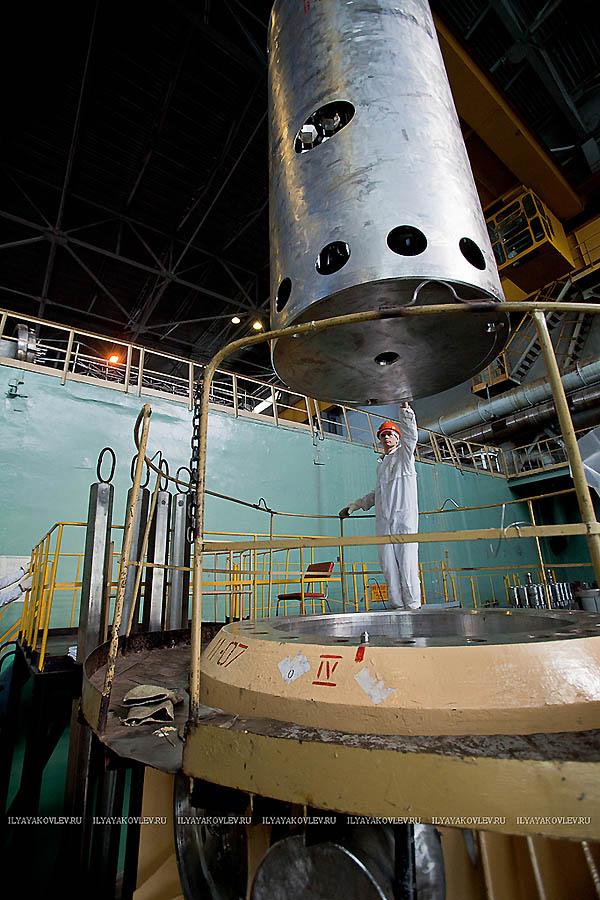
Crane controls the crane from any convenient place of him.
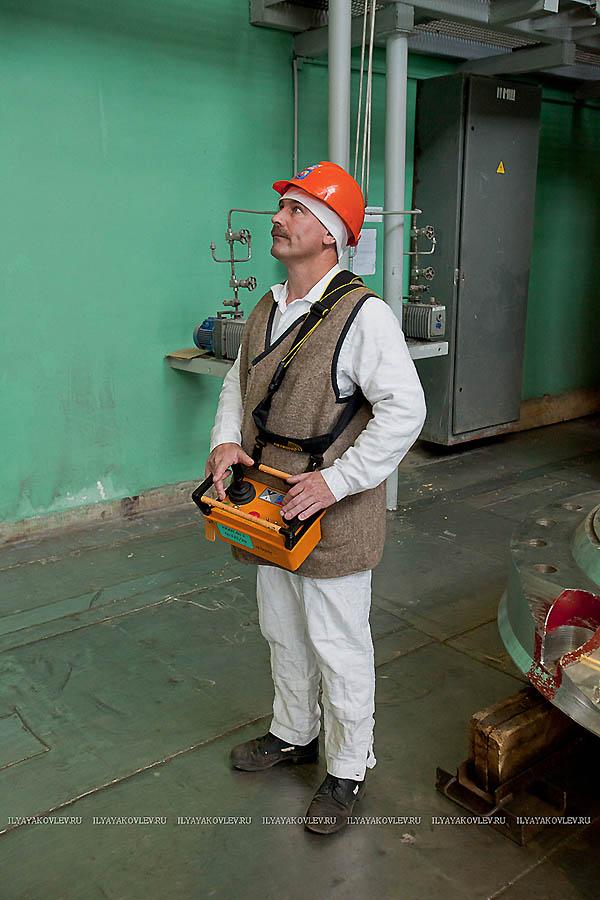
On the sides of the containers tselnonerzhaveyuschie. As I explained these only 16 in the world.
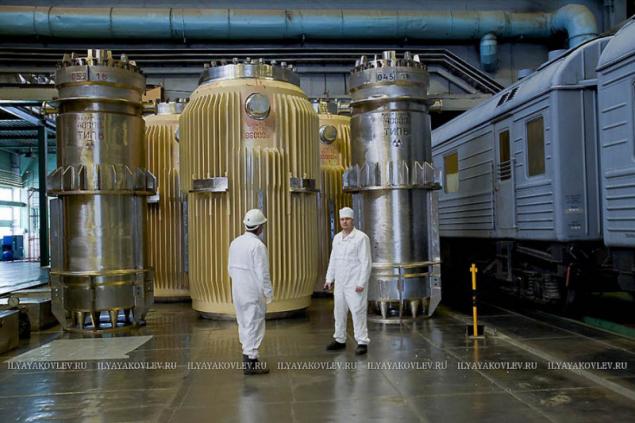
Small 40 tons, 96 large
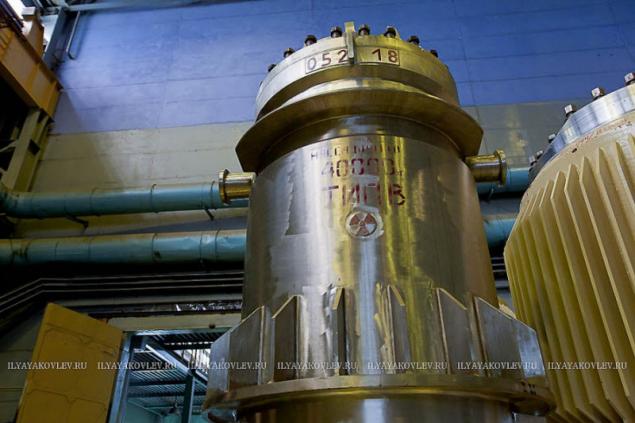
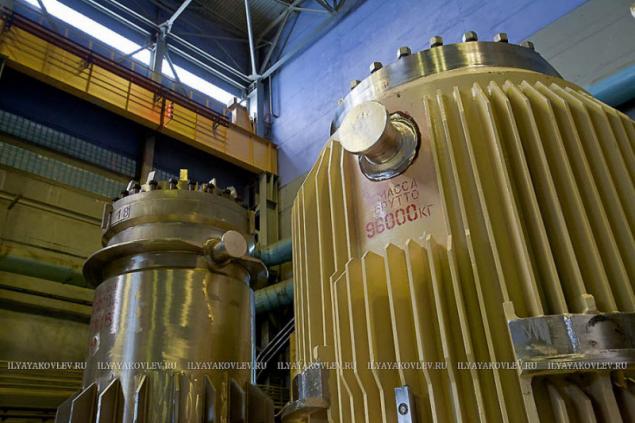
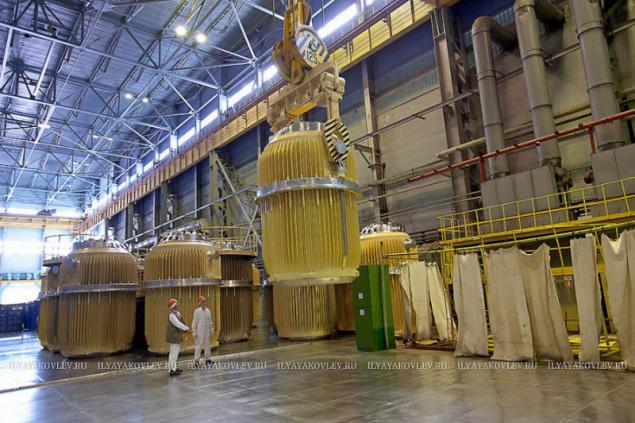
In spite of all the historical heritage of the processability, and here and there.
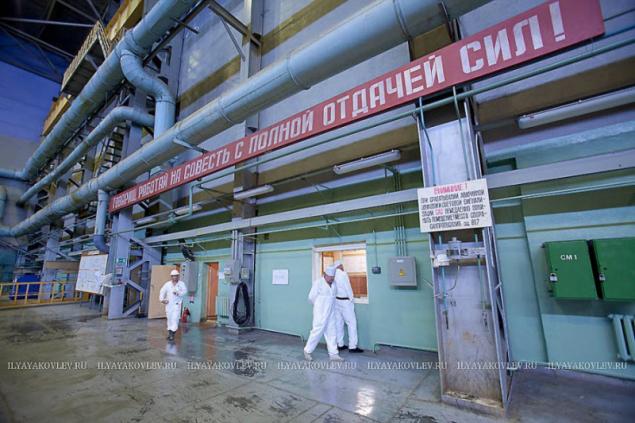
Shipping container train wagon. Each of the cars is specially equipped for the transport of such goods.
Containers are provided with means of detection. One of the carriages of the train is the controlling operator
that it is watching from their control of the state of each container. The cars in front
sending thoroughly washed.
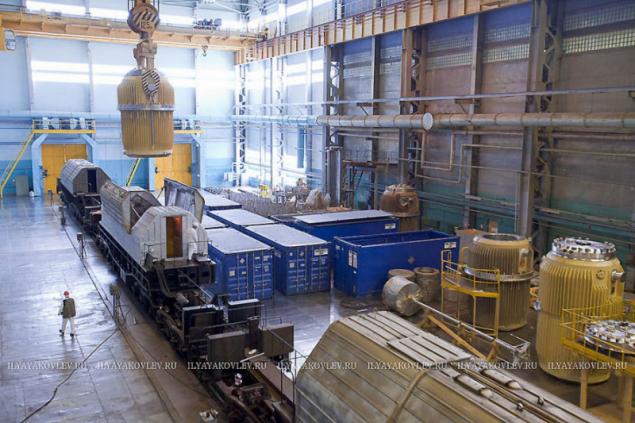
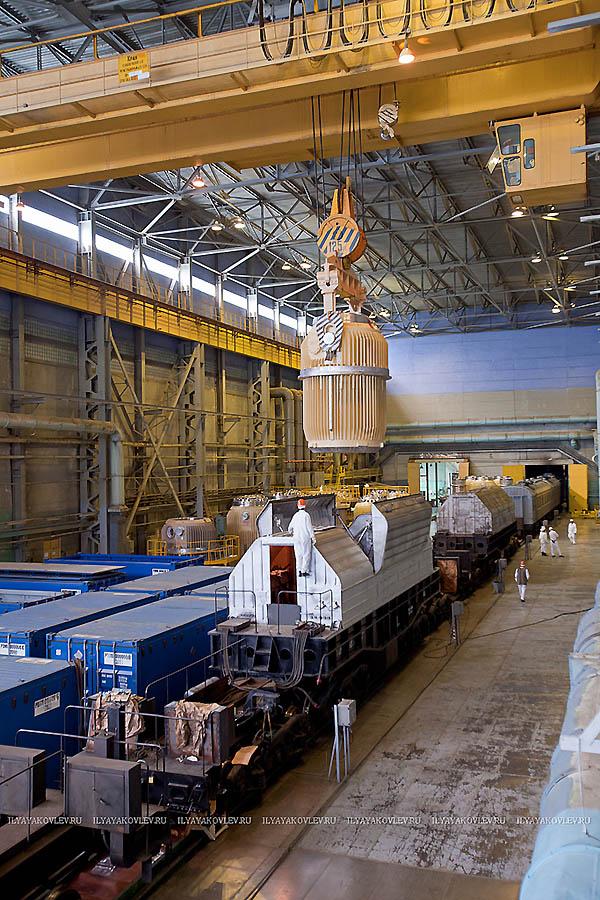
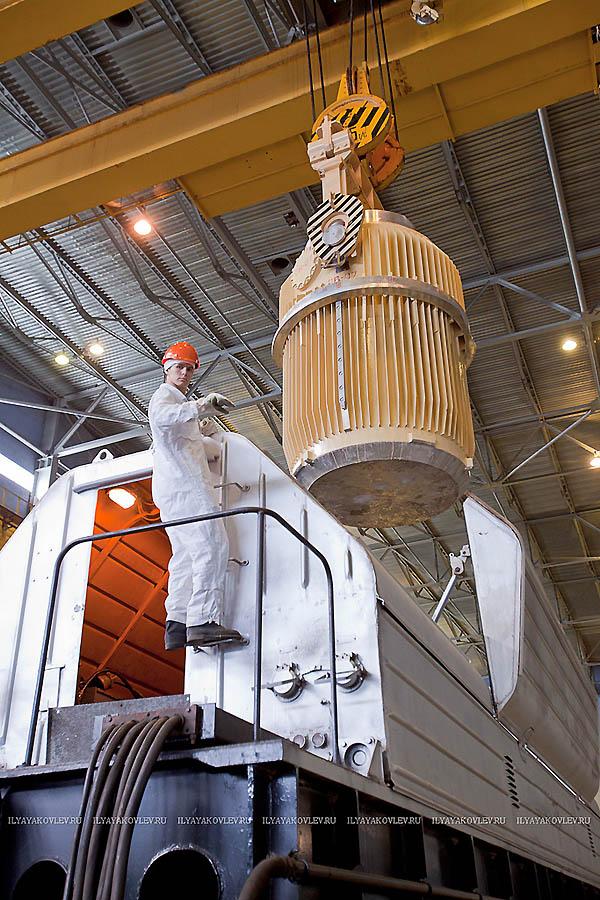
The compartment in the interior of the car.
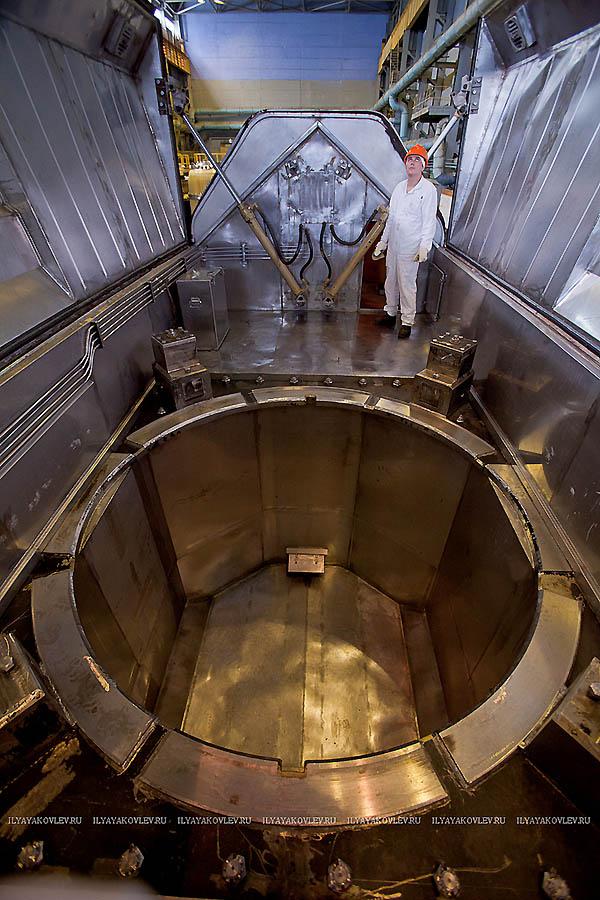
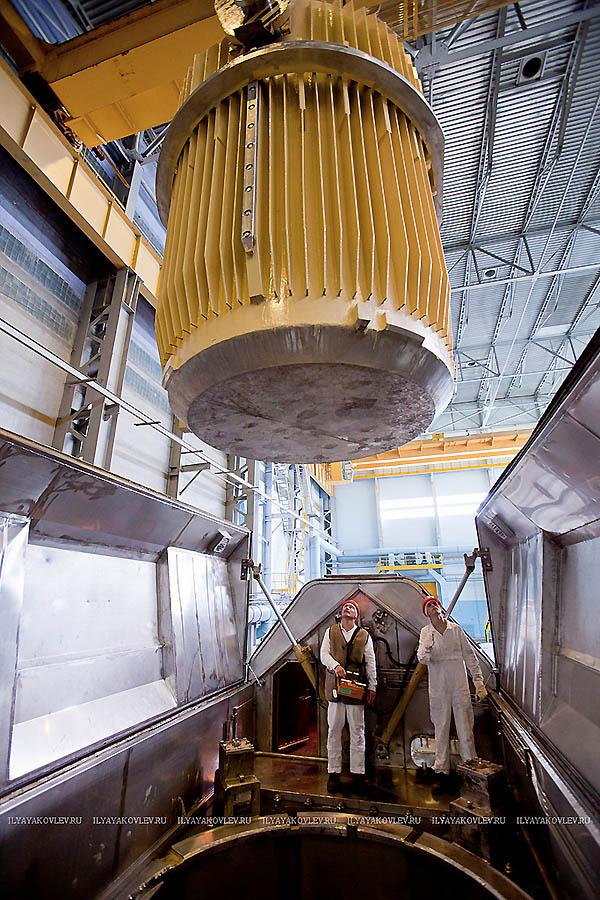
Panorama shop.

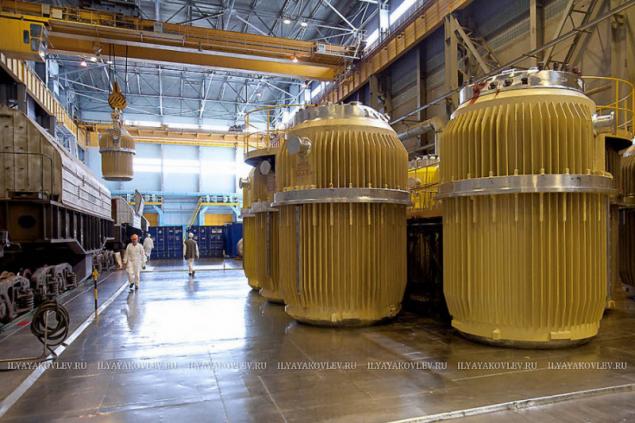
Tanks for the transport of uranium. He loaded the cylinders above and below, separated by a safe distance.
The rest of the container designed to withstand these distances and cooling.
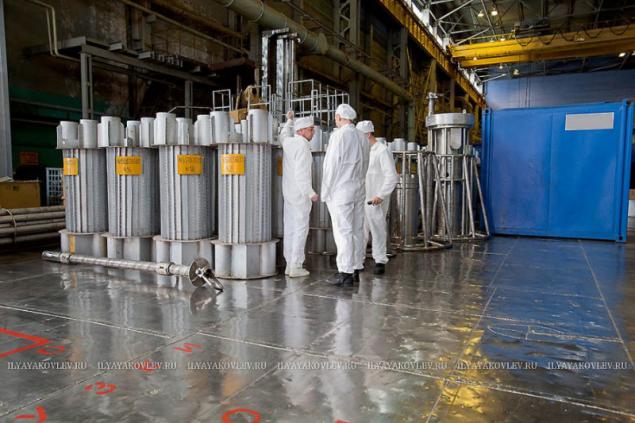
At the exit were checked.
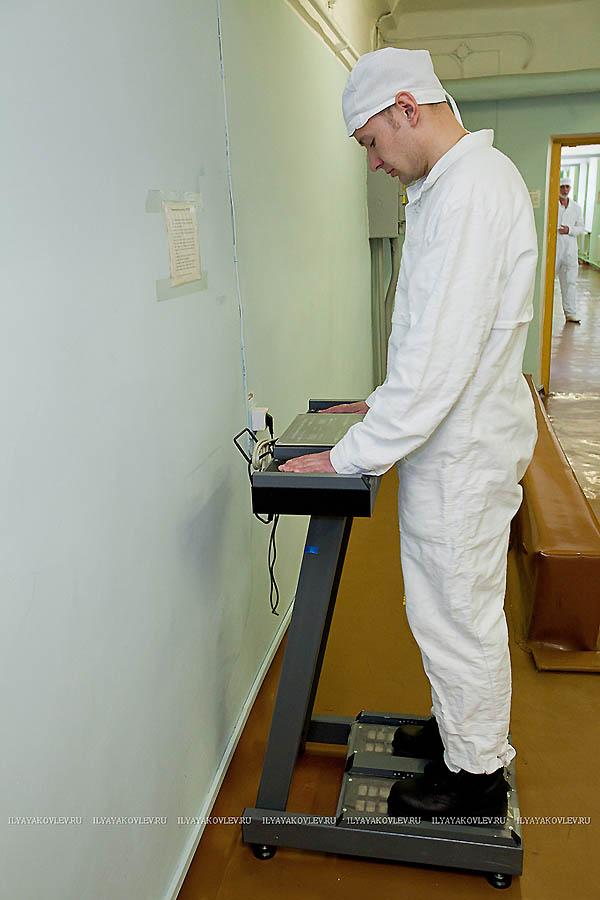
That is the testimony of my companion
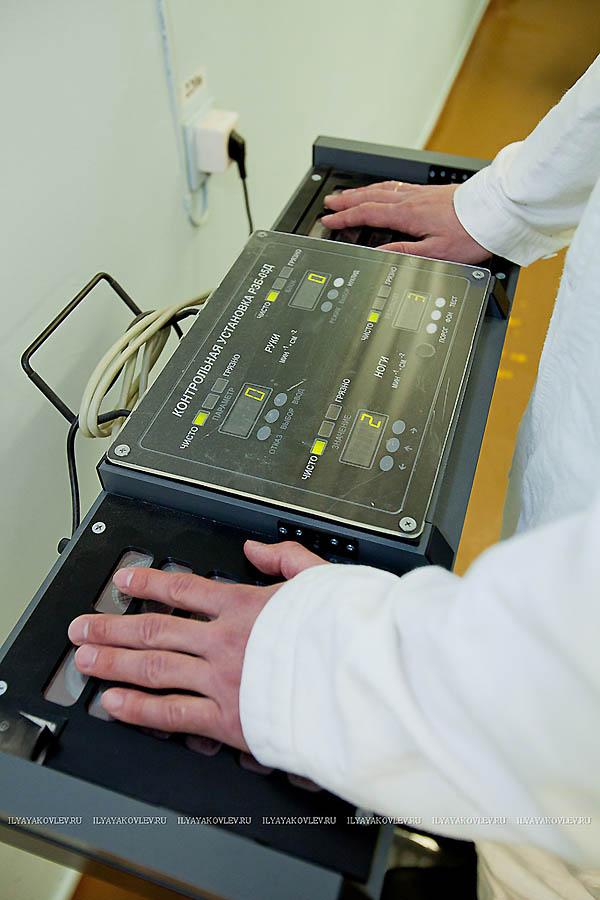
via source
No joke, this place is one of the most high-tech enterprises in Russia, here
had in 1948 launched the first nuclear reactor in the USSR, a specialist in "Mayak" was released
charge plutonium for the first Soviet nuclear bomb. When the called Ozersk
Chelyabinsk-65, Chelyabinsk-40, in 1995 he became Ozersk. We Triokhgorny,
once Zlatoust-36, the city which is also closed, Ozersk always called
"Sorokovke" treated with respect and awe.

It is now possible to read much into the official sources, and even more in the informal,
but there was a time when even the approximate location and the name of the city were kept in the strictest
secret. I remember me and my grandfather Eugene M. Yakovlev, went fishing, duck on
local issues - where we are, my grandfather always told that Yuryuzan from (the neighboring town with Trehgornyi),
and at the entrance to the city there were no signs other than constant "brick". My grandfather was one of
best friends, called him Mitroshin Yuri Ivanovich, why I did it all my childhood called not otherwise
as "Vanaliz" I do not know why. I remember I asked my grandmother why,
Vanaliz, a bald, because not a single hairs? Grandmother then told me in a whisper,
Yuri Ivanovich served in "sorokovke" and eliminate the consequences of major accidents in 1957,
received a large dose of radiation, the procedure spoiled his health, and his hair grow longer ...

... And now, many years later, I, as a photojournalist to shoot the same food plant RT-1
Agency "Photo ITAR-TASS". Time changes everything.

Ozersk - modal city, enter a pass, my profile was more than a month to check and
Now everything is ready, you can go. I met the press officer at the checkpoint, unlike
here is our normal computerized system call in any PPC traveling so
as any. After that we drove to the administrative building of the press service, there I left
my car, and I was advised to leave the cell because inside the plant with
Mobile communications is prohibited. Said done, we go to the RT-1. The plant
long toiled at the checkpoint, as it is not just we have missed with all of my photographic equipment, but it
It happened. We were given a stern man with a black holster on his belt and a white dress. We met
with the administration, we have formed a team of escorts and we moved to the rank. propusknik.
Unfortunately, the exterior of the plant, and what a security complexes photographed
is strictly forbidden, on this all this time my camera was lying in a backpack. Here's the footage I
withdrew at the very end, there begins conventionally "dirty" area. Separation is
indeed arbitrary, but follow very strictly, that is what makes it possible not to take away
radioactive dirt all over the neighborhood.

San. propusknik separate women from one entrance to another man. I have my companions
shown on the cupboards, and said shoot all (absolutely all), wear rubber flip flops, closes
locker and move out to the window. So I did. I stand completely naked in one hand
I key in another bag with a camera, and the woman out of the window, which is why it is
too low for such a situation interested in my what my shoe size. Long
did not have to be embarrassed, I was promptly given something like drawers, light shirt,
overalls and shoes. All white, clean and very pleasant to the touch. Dressed, trailers for
breast pocket dosimeter tablet and felt confident. You can be nominated.
Guys I immediately instructed that the backpack on the floor not to, do not touch too much,
photographed only that allow. No problem - I tell me the backpack is too early
throw, and the secrets of the problem I also do not need. Here is the place where to attach and remove
dirty shoes. At the heart of clean, dirty on the edges. Conditional threshold of the territory of the plant.

On the territory of the plant, we moved to a small bus. Foreign territory without special
embellishment, blocks of shops galleries related to the passage of personnel and transfer of chemicals through the pipes.
On the one hand there is a large gallery finishing intake air from the nearby forest. It
done to the people in the shops outside breathing fresh air. RT-1 is only
one of seven factories "Mayak", the appointment of its reception and processing of spent nuclear
fuel (SNF). This shop where it all begins, here come the containers with spent nuclear fuel.
On the right car with the lid open. Experts unscrew top screws special
equipment. After that, all of this space is removed, a large door closes
thickness of about half a meter (unfortunately rezhimschiki asked her to remove the pictures).
Further work is cranes, which are controlled remotely via the camera. Cranes removed
Cover and remove from the spent fuel assemblies.

Crane assemblies are transferred here in these hatches. Pay attention to the crosses, they are drawn,
It makes it easier to position the position of the valve. Under the hatches assembly immersed in
liquid - condensate (simply put in distilled water). After this assembly
carts are moved to a nearby swimming pool, which is a temporary warehouse.



I do not know exactly what it's called, but the point is clear - a simple device to avoid
drag radioactive dust from one room to another.

On the left, the same door.

And this is the adjacent room. Underfoot employees is a swimming pool, with a depth of 3, 5 and 14
meters filled with condensate.? Yet there can be seen two blocks from the Beloyarsk NPP, their length of 14 meters.
AMB called - "a great peaceful atom».

When you look between the metal plates, you see something like the following picture. Under condensate
you can see the assembly of the fuel cell from the shipping of the reactor.


Insipid frame, just like the way the elements are arranged.

But these assemblies come only from nuclear power plants. When turned off the light, they glowed a pale blue glow.
Very impressive. This is the Cerenkov radiation, the essence of this physical phenomenon can be found in Wikipedia.

General view of the shop.

Go ahead. Transitions between departments through the corridors with dim yellow light. Underfoot enough
specific coating, roll all the angles. People in white. In general, I like that once, "Black Mass»
remembered))). By the way, about the coverage, a very reasonable decision, on the one hand it's more convenient to wash,
It does not get stuck anywhere, and most importantly, in the event of any leak or accident can be a dirty floor
easy to dismantle.

As I explained further operations with SNF are indoors in an automatic mode.
The whole process, when it ruled here with these consoles, but now everything happens on three terminals.
Each of them works in its stand-alone server, all the functions are duplicated. In case of refusal of
terminal operator will be able to complete the process from the console.

Briefly about what happens to the spent nuclear fuel. Build understand, stuffing removed, sawn into
pieces and placed into a solvent (nitric acid), then dissolved spent fuel
passes a complex chemical transformations, there is extracted from the uranium, plutonium, neptunium.
Not soluble portion that can not be processed and compressed osteklenyayutsya. And kept on
inside the plant under constant observation. At the exit after all these processes is formed
ready to build already "charged" with fresh fuel, which is produced here. Thus Lighthouse
provides a full cycle of the nuclear fuel.

Department on work with plutonium.

From the active elements of the operator protects eight layers of 50 mm leaded glass. Pointing
linked exclusively electrical connections, no "holes" connecting with the inner compartment no.


We moved into the shop, which deals with the shipment of finished products.

Yellow container for transportation of finished fuel assemblies. In the foreground of the container lid.

The inner container, here apparently mounted fuel rods.



Crane controls the crane from any convenient place of him.

On the sides of the containers tselnonerzhaveyuschie. As I explained these only 16 in the world.

Small 40 tons, 96 large



In spite of all the historical heritage of the processability, and here and there.

Shipping container train wagon. Each of the cars is specially equipped for the transport of such goods.
Containers are provided with means of detection. One of the carriages of the train is the controlling operator
that it is watching from their control of the state of each container. The cars in front
sending thoroughly washed.



The compartment in the interior of the car.


Panorama shop.


Tanks for the transport of uranium. He loaded the cylinders above and below, separated by a safe distance.
The rest of the container designed to withstand these distances and cooling.

At the exit were checked.

That is the testimony of my companion

via source
